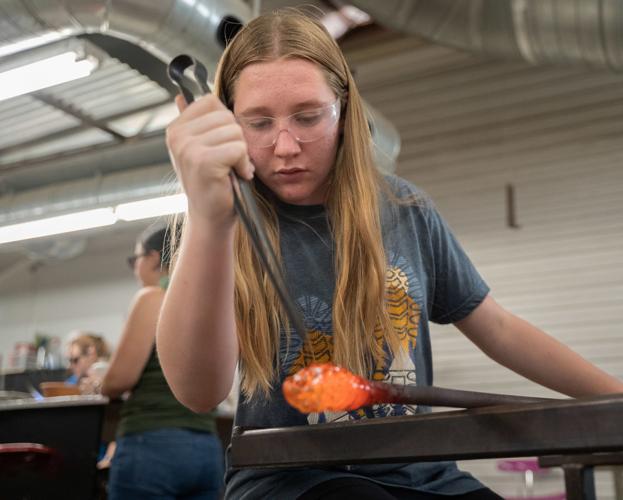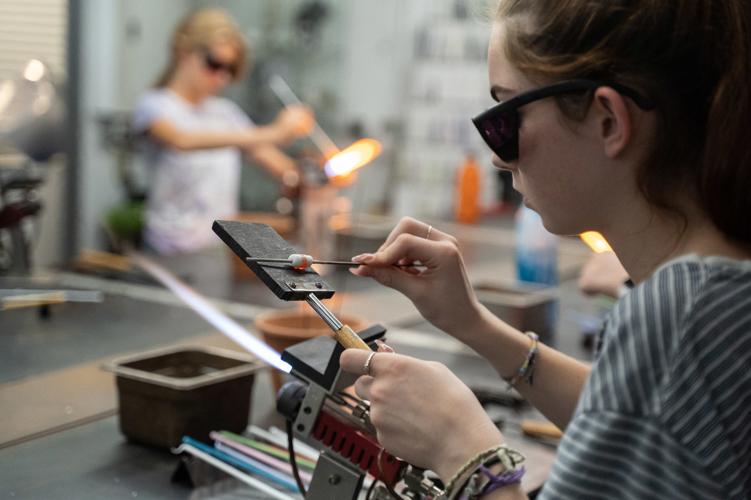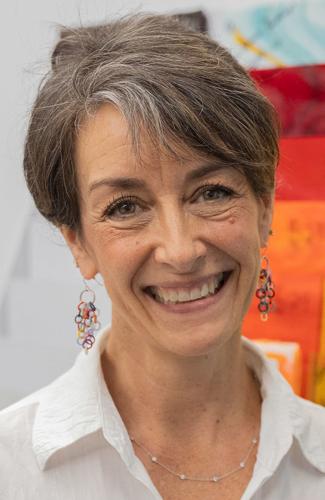The Sonoran Glass School was planning to renovate its studio near downtown Tucson last year when school leaders learned about a pilot program offered by Local First Arizona to help small organizations make their operations more sustainable.
School executive director Lynn Davis was intrigued but was unsure how much the SCALE UP program could help — given the school runs several gas-fired glassmaking furnaces and a crucible that keeps hundreds of pounds of molten glass at nearly 2,000 degrees, nearly year-round.
But after going through Local First Arizona’s SCALE UP (Sustainable Communities Accessing Lending and Expertise Upon Performance) program last year with 10 other local small businesses and nonprofits, Sonoran Glass School was able to build a more sustainable space and save money on its lighting and gas bills.
“This building and our programs present some really unique challenges from a resource consumption standpoint,” Davis said.
“I thought it was awesome that they were game enough to take us on.”
The SCALE UP pilot was a collaboration between Local First Arizona and the Arizona Department of Administration’s Office of Grants and Federal Resources, which gave the group a $50,000 grant to run the pilot from March through June last year.
Local First Arizona had been planning to propose a pilot sustainability program to capture bigger federal funding, but when funding from the Department of Energy was dropped, the group and state officials decided to go ahead with a smaller program, said Mike Peel, Southern Arizona director for Local First Arizona.
Partnering with Local First Arizona on the pilot were the Tucson 2030 District, part of a national public-private network aiming to reduce building energy consumption, water use and transportation emissions 50% by 2030; and Physicians for Social Responsibility.
Local First members selected through a competitive application process were guided through six workshops covering local energy usage, water waste, and transportation conservation.
The participants used checklists to track their progress through set benchmarks and created individual plans aimed at achieving at least a 10% reduction in overall resource usage.
Local First also partnered with the non-profit Community Investment Corp. to create a revolving fund for low-interest loans of $500 to $10,000 for resource efficiency improvements.
Though results are still being tracked, the pilot was deemed a success, with most participants on pace to meet their efficiency targets, Peel said.
“Everything we set out to do in terms of the outcomes, we were able to achieve,” Peel said. “Just the fact they were able to put together a plan can lead to 10% reductions … because it creates awareness and interest from employees to do more.”
CJ Agbannawag, SCALE UP manager, said the program benefits go far beyond dollars and cents.
“The whole purpose of the program, in my eyes, is to break down barriers to sustainability,” he said. “People think sustainability is all about solar panels and Teslas and expensive things, but it’s not.
“It’s not as simple as turning the lights off … true sustainability is about helping everyone rise up, so even people who don’t have the largest budget can be sustainable and use some mechanism to save some money.”
In recognition of its innovative program, SCALE UP was the recipient of the Go Green Business Development Partner Award from Tucson Electric Power Co., while a Tucson 2030 Changemaker Award was awarded to Local First Arizona and SCALE UP participant Merit Foods.
The companies that made it through the program and achieved their goals were awarded a package of incentives in the form of free or discounted services from program partners Tugo Bike Share, local solar installer Technicians for Sustainability, Bostonia Business Solutions, Ecoblue, Simple Energy Solutions, DP Air Corp. and the City of Tucson Environmental Services.
Other SCALE UP program partners, including the City of Tucson, the University of Arizona, and the U.S. Environmental Protection Agency, provided expert speakers and workshop curricula.
Students from the UA trained to become EPA-certified sustainability “ambassadors” to work with SCALE UP participants as interns.
Sonoran Glass School’s Davis said with the help of a program partner that provided infrared images of heat leakage at the studio, the school was able to design its furnace facility with more venting and insulation, making the equipment more efficient while keeping the workspace cooler.
“We had access to all sorts of expertise that wouldn’t have been available to us otherwise,” she said.
The school also changed out all of its fluorescent lighting with energy-efficient LED tubes, taking advantage of rebates offered by TEP as part of its state-mandated energy efficiency incentive programs.
Davis said the glass school’s gas bill runs about $1,400 monthly, but with the revamped furnace areas the school has seen about a 4% decrease in its utility bills so far this year, even with much more studio usage compared with last year.
More recently, the school’s April utility cost was down about $500 compared with April 2018, she said.
Matt Sadowksy, president of Merit Foods, said the food distribution company spends about $13,000 a month on electricity to run operations including a 10,000-square-foot refrigerator-freezer.
Sadowsky said it’s a little too early to compare savings, but he believes after changing to LED lighting and taking other measures, a 10% cut in the company’s electric bill is an achievable goal.
The family-owned company, which was founded in 1961 and employs about 100 workers, also has installed water-saving nozzles on production equipment and started an office recycling program, he said.
But both Sadowsky and Davis said the links they forged with other local sustainability resources and other participants will pay dividends for years to come.
Besides the Sonoran Glass School and Merit Foods, participants in the SCALE UP pilot were Borderlands Brewing Co., the Community Food Bank of Southern Arizona, Delectables Catering and Venue, Gloo Factory print shop, LeadLocal, Pop Cycle, Surly Wench Pub, Tucson Thrift Shop, and Wholesum Harvest, a farming operation and greenhouse in Amado.
“It was not only learning about sustainability and different practices other companies are doing, it was a good networking opportunity with like-minded businesses,” Sadowsky said.
Davis said through the program, she was connected with a local company to use the school’s multi-colored waste glass, which the city doesn’t recycle, as an aggregate for concrete planters, saving hundreds of pounds from the landfill weekly.
Peel said Local First is working on a successor program to the SCALE UP pilot with the City of Tucson that will be announced in the near future, and is looking for new funding opportunities through the UA and national and federal grants.
“We’ve proposed expansion of the program, across the state, since were a statewide organization, and that’s of particular interest to the state, that it not just be a Tucson program,” Peel said.







